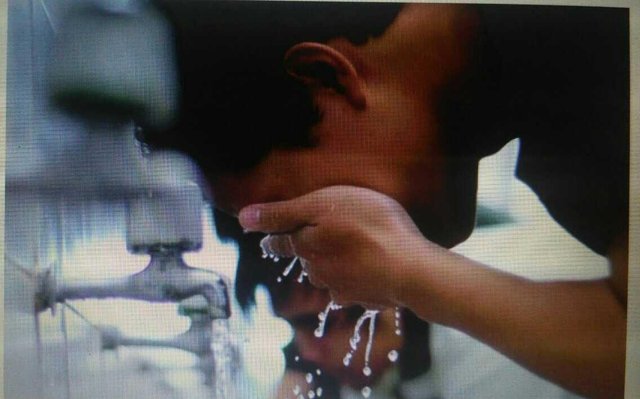***History Required Ablution Before Praying***

We, Muslims in Indonesia in particular, already have a worldview if wudu and prayer are two inseparable things. In the explanation of jurisprudence, ablution is known as the legal requirement of prayer. In other words, our prayers can not be called valid if they do not perform ablution.
Also commonly known, is when the first prayer commands were revealed. Usually, in every event commemorating the events of Isra 'Miraj, the da'i will usually tell that on this occasion the Messenger of Allah. given the command of prayer.
Prayers are initially ordered as much as 50 times. Then on the "input" of Prophet Musa As. to the Prophet Muhammad SAW, down to only 5 time.
But, rarely ask when first disyariatkannya ablution? whether he was commanded along with prayer, or apart, or after, or before?
In some books of fiqh, such as Fath al-Mu'in, it is not mentioned when the ablution is mentioned, there is only mentioned that prayer is prescribed before the hijra to Medina, in the tenth year of Muhammad's prophethood.
In the same opinion in other Shafi'iyyah jurisprudence books, such as Hasyiyah Qalyubi 'ala al-Mahalli. Imam Qalyubi, the author of the book also gives a number of other opinions.
According to him, some argue that the new ablution is prescribed in the 16th year of prophethood. However, interesting because al-Qalyubi also presents an opinion stating that the shari'a of wudu is the Shari'a of the previous people.
An explanation of the historical genre of prayer can be found in a 94-page book titled Tarikh al-Shalat. Jawwad Ali.
As a historian, he elaborates on the history of shari'a ablution, by initiating an explanation through the Islamic tradition. The hadith was chosen as the advocate of his first explanation.
The story of al-Baihaqi in al-Dalail al-Nubuwwah mentions that ablution is prescribed simultaneously with the teaching of prayer by the angel Gabriel to the Prophet.
عن محمد بن إسحاق قال وكانت خديجة أول من آمن بالله ورسوله وصدق بما جاء به قال ثم أن جبريل عليه السلام أتى رسول الله حين افترضت عليه الصلاة فهمز له بعقبه في ناحية الوادي فانفجرت له عين من ماء مزن فتوضأ جبريل ومحمد عليهما السلام ثم صليا ركعتين وسجدا أربع سجدات ثم رجع النبي قد أقر الله عينه وطابت نفسه وجاءه ما يحب من الله فأخذ بيد خديجة حتى أتى بها العين فتوضأ كما توضأ جبريل ثم ركع ركعتين وأربع سجدات هو وخديجة ثم كان هو وخديجة يصليان سرا
"From Muhammad ibn Ishaq said: that Khadija was the first to believe in Allah SWT. and his apostle and believe in the truth of his teaching. Then, Gabriel alaihi-s-salam came to the Messenger of Allah. when already (decreased orders) is required to pray. Then, the Angel Gabriel pressed his heel on one side of the valley, then poured on the cold spring and used by the angel Gabriel and the Prophet Muhammad. ablution, then they both prayed two rak'ahs and four prostrations. Afterwards, Rasulullah Saw. back home and the springs were made by God still destroyed, happy feelings of the Prophet and return the water's eyes with Khadija to perform the prayer. Both perform ablution as Gabriel did, then pray two rak'ahs and four prostrations in secret. "(Narrated by Al-Baihaqi in Dalail al-Nubuwwah)
From this hadith also, it can be concluded that there are differences of opinion among historians about the occurrence of Isra 'Mi'raj and Khadijah's death.
Ibn Ishaq, as Ibn Hisham later quoted as saying that the new Khadija died after the events of Isra 'Mi'raj. Thus, wudu was already known by Khadija and some other Muslims before migrating to Medina.
How to Problem Verse "Idza qumtum ila-s-shalaati fa-ghsiluu wujuuhakum ..."?
Meanwhile, those who argue that newly prescribed in Madinah, hold to asbab al-nuzul verse 5 of this surah al-Maidah.
Tahir ibn 'Ashur, Tunisian commentator explains that seeing the Surah al-Maidah is among the most recent descending letters, this verse does not indicate that the new ablution is prescribed, the wudhu has been taught along with the prayer, based on the hadith narrated by al-Baihaqi.
While the position of this verse, is the explanation of among the blessings of Allah Almighty. which is given to the cautious mankind. Ibn 'Ashur's opinion in his tafsir.
Or, as Ibn Hazm puts it in his work in history, al-Sirah al-Halbiyah as quoted by Jawwad Ali, says that the ablution of wudu is makiyyun fi al-fardh, wa madaniyyun fi al-tilaawah (required in Mecca, but the Quran is revealed in Medina).
Wallahu A'lam.